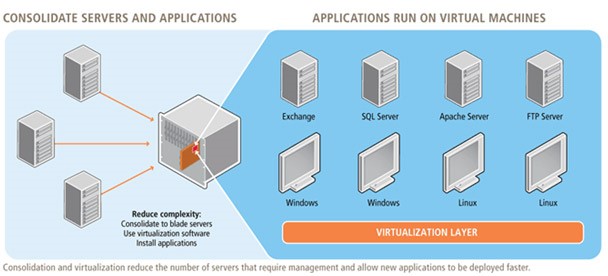Smart System Service helps Enterprises take critical steps in building new virtual infrastructures as well as transforming existing infrastructure to support most business critical applications. We have designed and implemented virtualized solutions for many Enterprise and SMB organisations with an excellent track record in delivering reliable and cost-effective IT network and security, keeping the enterprise business demands and challenges.
We have an extensive experience of providing Virtualized solutions and we are an ideal solution partner to design new environments along with upgrading existing environments using the portfolio of our partner solutions. Our experience includes design and implementation of Virtualization.

Server Virtualisation

Desktop Virtualisation

Storage Virtualisation

Network Virtualisation
Server virtualization enables multiple operating systems and applications to run simultaneously on different virtual machines created on the same physical server (or group of servers). Virtual machines provide a layer of abstraction between the operating system and the underlying hardware. Within a physical server, any number of virtual servers can be established; depending on hardware capabilities. Each virtual server seems like a physical machine to the operating system, although all virtual servers share the same underlying physical hardware in an isolated manner. For example, the physical memory is shared between virtual servers but the address space is not. Individual virtual servers can be restarted, upgraded, or even crashed, without affecting the other virtual servers on the same physical machine.
With changes in computing from a dedicated to a client/server model, the physical server faces resource conflict issues when two or more applications running on these servers have conflicting requirements (e.g., need different values in the same registry entry, different versions of the same DLL). These issues are further compounded with an application’s high-availability requirements. As a result, the servers are limited to serve only one application at a time, as shown in Figure. On the other hand, many applications do not take full advantage of the hardware capabilities available to them. Consequently, resources such as processors, memory, and storage remain underutilized.
Server virtualization addresses the issues that exist in a physical server environment. The virtualization layer, helps to overcome resource conflicts by isolating applications running on different operating systems on the same machine. In addition, server virtualization can dynamically move the underutilized hardware resources to a location where they are needed most, improving utilization of the underlying hardware resources.
